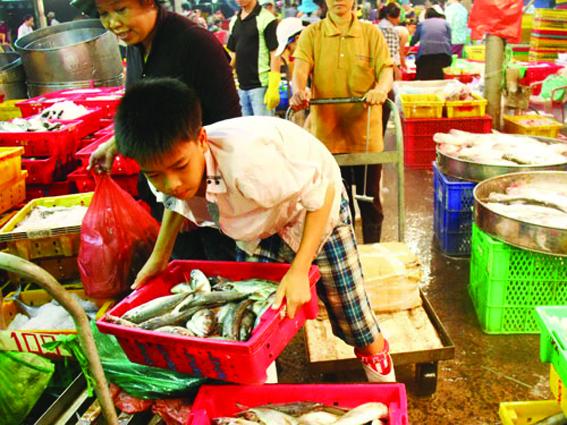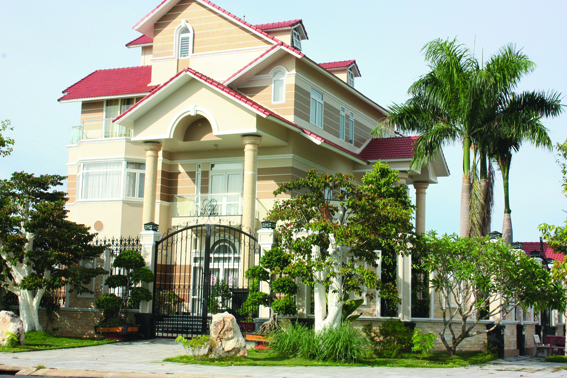The Vietnam National Administration of Tourism (VNAT) has requested provincial Culture, Sports and Tourism Departments to tighten management of tourist guides in their localities in a move to tackle emerging operations of illegal foreign guides across the country.
The Administration urged provincial Culture, Sports and Tourism Departments to increase inspection and strictly handle violations, ensuring foreign visitors to be accompanied by licensed guides.
It also warned international travel firms that failed to employ lawful guides might have their international travel business licenses revoked.
Recently booming activities of unlawful foreign guides nationwide have grown into a major headache for tourism authorities, which, in the first months of this year, detected many foreign tourist delegations visiting tourist sites without a local guide or with an unlicensed foreign guide.
Under the Tourism Law, a tourist guide must be a Vietnamese citizen and live in Vietnam, but in reality, many foreigners have been providing guide services illegally at tourist destinations.
In Khanh Hoa central province, a popular tourist destination which boasts one of the world’s most beautiful bays - Nha Trang, Russian guides were easily found in the well-known tourist site of Po Nagar, a Cham temple complex in Nha Trang city. According to the Thanh Nien (Young People) online, more than half of the guides of the two companies which brought 80% of Russian tourists to Vietnam were Russian.
Russian tourist guides also operated widely and openly along Nha Trang streets, offering the services at only USD 15-20/visitor, which covered from arranging cars to taking foreign tourists inside and outside the province, the Nguoi Lao Dong (Laborer) online reported.
The same situation was reported in other cities and provinces such as Hanoi, Ho Chi Minh, Da Nang, Quang Ninh, Ninh Thuan and Quang Nam. Most foreign tourists accompanied by foreign tour guides came from South Korea, China and Russia, according to Truong Quoc Hung, director of Hanoi Star Tour.
According to a former official of VNAT, in recent years, foreign travel firms which cooperated with Vietnamese partners to bring foreign tourists to Vietnam often tended to cover all services, except for guides. But now they also took charge of this job even though foreign tour operators were banned in Vietnam.
A common practice of international travel firms was to hire Vietnamese tourist guides to make it legal to local authorities while they actually allowed foreign guides to serve visitors from arranging hotels, restaurants and cars to guiding tours, Tran The Dung, deputy director of The He Tre (Young Generation) Travel Company in Ho Chi Minh City told the Nguoi Lao Dong.
This practice was often employed by Korean travel firms which even bargained with local tourist companies to buy a tour only if having their own Korean guides who would arrange everything for visitors, Pham Tien Dung, director of Golden Tour said on the government web portal. As a result, Korean visitors who used to come to Vietnam through Vietnamese travel firms now chose Korean firms which offered much lower prices.
Illicit operations of foreign guides not only caused loss to the local tourism industry but more seriously, resulted in poor tourist quality, largely hurting the image of Vietnam, its people and the national tourism industry, industry insiders said.
It was dangerous if we did not promptly deal with illegal foreign guides who might not exactly and fully understand Vietnamese history and culture as well as background of tourist destinations in the country, said a director of a travel firm in Ho Chi Minh City, pointing out this might lead to distortion of the country’s history, adversely affecting the national image to foreign people.

__Photo: Ha Thai/VNA
If prompt solutions were not worked out, the aftermath would be really harmful, Nguyen Van Thanh, Director of Khanh Hoa provincial Tourism Promotion Center told the Nguoi Lao Dong, stressing there was no way to control information conveyed by illegal foreign guides who could make foreign visitors misunderstand about Vietnam’s culture, history and customs.
Industry insiders also pointed out foreign guides might take visitors to expensive shops to earn commissions, triggering bad fame for Vietnam’s tourism.
Nguyen Manh Cuong, deputy general director of VNAT, acknowledged the situation was a result of lack of professional guides given the rising number of foreign visitors from a number of emerging markets, including Russia, South Korea and China.
Last year, Khanh Hoa, for instance, hosted 150,000 Russian visitors whose number was expected to double this year. The numbers of Taiwanese, Chinese and South Korean visitors were also increasing in the province which now had only around 80 local tourist guides speaking Russian, Chinese and Korean.
Lax management by state agencies and connivance of local travel firms, which provided sitting guides merely to stand for foreign guides, were other reasons behind the chaotic operations of tourist guides, analysts said. They also blamed on the absence of sanctions and a lack of tourism inspectors given sophisticated frauds committed by foreign travel firms and individuals.
To redress the situation, authorities in several localities have been intensified inspection and crackdown on illegal operations of foreign tourist guides.
Quang Nam province last year fined a number of Korean tourist guides for illegal operations. In 2012, it also imposed a total fine of VND 300 million (roughly USD 14,000) on violating foreign guides, including two Chinese being expelled from Vietnam, Nguyen Duy Quang, chief inspector of the province’s Culture, Sports and Tourism Department told the Nguoi Lao Dong, however acknowledging there was no way to detect violations related to information explained by foreign guides to visitors.
Da Nang also fined many unlawful foreign guides who came mostly from South Korea, China and Russia, according to Tran Chi Cuong, deputy director of the municipal Culture, Sports and Tourism Department.
In addition, several localities have been speeding up their plans to provide language training in Russia, Chinese and Korean for local tourist guides.
Khanh Hoa province’s Culture, Sports and Tourism Department has submitted a tourist guide training plan to the Ministry of Culture, Sports and Tourism for approval.
Nguyen Van Tuan, general director of VNAT, advised that localities should translate information about tourist destinations into different languages for introduction to foreign tourists while urgently training professional tourist guides.
The Ministry of Culture, Sports and Tourism has since 2013 launched a program to support tourist guide training which was expected to start in Khanh Hoa province and Phan Thiet city in the second quarter of this year before expanding to Ninh Thuan, Vung Tau, Phu Yen and Phu Quoc, Tuan added.- (VLLF)

